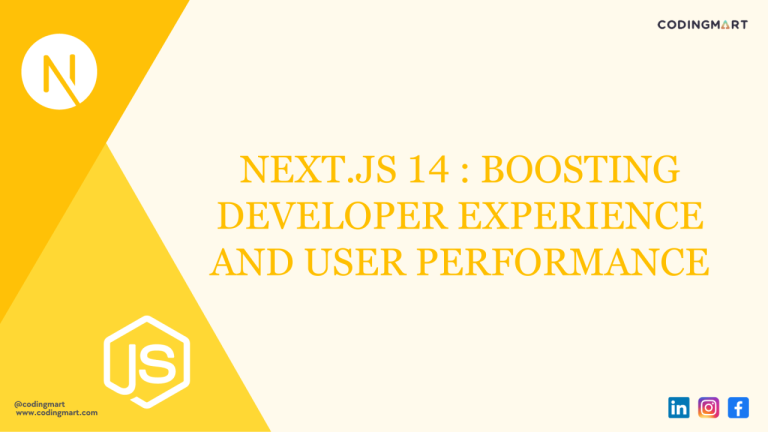blogs
Next.js 14: Boosting Developer Experience & User Performance

Greetings, Next.js Enthusiasts,
We are thrilled to unveil the groundbreaking features of Next.js 14, a game-changing update that redefines the way you develop web applications. In this edition, we delve into the remarkable enhancements that this version brings to the table. From unparalleled speed boosts to simplified server-side code execution, Next.js 14 is designed to elevate your development experience without compromising on user performance. Join us as we explore the key highlights and the endless possibilities this update opens up for developers like you.
Turbopack: A Speed Boost
Experience a 53% faster local server startup and a remarkable 94% speedier code update with Fast Refresh, all without altering a single line of code. Turbopack’s upcoming move to “stable” is set to revolutionize how you approach Next.js development.
Server Actions: Simplified Data Mutations
Say goodbye to dedicated API routes! Next.js 14 introduces Server Actions, enabling you to trigger server-side code securely using just a function defined in your React component. This simplifies your code, reduces network round trips, and enhances the overall user experience. The introduction of Server Actions into stable release status is a game-changer.
You can now trigger server-side code securely with just a function defined in your React component. It simplifies your code and enhances the user experience by reducing the number of network roundtrips needed for data mutations and page re-rendering.
Example:
export default function Page() {
async function create(formData: FormData) {
‘use server’;
const id = await createItem(formData);
}
return (
<form action={create}>
<input type=”text” name=”name” />
<button type=”submit”>Submit</button>
</form>
);
}
Metadata Enhancements: What Lies Beneath
Next.js 14 not only enhances user-facing features but also fine-tunes what happens under the hood. Metadata options like viewport, colorScheme, and themeColor have been enhanced to improve the initial rendering experience and minimize layout shift. Stay updated with the latest changes, including the raised minimum Node.js version to 18.17 and a few API modifications.
Partial Prerendering: The Best of Both Worlds
Enter the world of Partial rendering, the star feature of Next.js 14. Bridging the gap between SSR and SSG, it delivers a rapid initial static response while streaming dynamic content based on React Suspense boundaries. Enjoy the performance of static sites combined with the dynamism of server-rendered apps, all without the need to learn new APIs.
Partial rendering is an experimental feature that allows you to render a route with a static loading shell, while keeping some parts dynamic. In other words, you can isolate the dynamic parts of a route. For example:
When a user visits a route:
- A static route shell is served, this makes the initial load fast.
- The shell leaves holes where dynamic content will load in async.
- The async holes is loaded in parallel, reducing the overall load time of the page.
This is different from how your application behaves today, where entire routes are either fully static or dynamic.
Key Takeaways from Next.js 14:
- Server Actions enable triggering server-side code seamlessly within your React components.
- Partial Prerendering offers a blend of static site speed and server-rendered app dynamism.
- Turbopack enhances local development performance with faster server startup and code updates.
- Metadata improvements ensure essential data are sent with initial page content, eliminating page flickering.
Conclusion:
In the ever-evolving landscape of web development, staying at the forefront of innovation is paramount. Next.js 14 emerges as a beacon of progress, offering developers a seamless experience and users lightning-fast interactions. With features like Turbopack, Server Actions, and Partial Prerendering, Next.js 14 not only simplifies your workflow but also enhances the end-user experience. As we bid adieu, we encourage you to embrace these transformative updates, explore their potential, and continue shaping the future of web development. Happy coding, and here’s to a future of limitless possibilities with Next.js 14!